 Both Shepherd Husky and Yochon are originated from United States. Shepherd Husky may grow 36 cm / 15 inches higher than Yochon. Shepherd Husky may weigh 31 kg / 69 pounds more than Yochon. Both Shepherd Husky and Yochon has same life span. Both Shepherd Husky and Yochon has almost same litter size. Both Shepherd Husky and Yochon requires Moderate Maintenance.
Both Shepherd Husky and Yochon are originated from United States. Shepherd Husky may grow 36 cm / 15 inches higher than Yochon. Shepherd Husky may weigh 31 kg / 69 pounds more than Yochon. Both Shepherd Husky and Yochon has same life span. Both Shepherd Husky and Yochon has almost same litter size. Both Shepherd Husky and Yochon requires Moderate Maintenance.
Basic Information
undefined
United States
United States
Life Span:
10 - 14 Years
10 - 14 Years
Other Names:
German Husky, Husky-Shepherd
Bichyorkie • Borkie • Yo-Chon • Yochon • Yorki-Chon • Yorkichon • Yorkiechon • Yorkie-Chon • Yorkie-Bichon • Yorkshire Frise
Colors Available:
white, grey - mix of colors, black, fawn, Cream
Black, Blonde, Brown, Cream, Dark, Brown, Golden, Gray, White
Coat:
Medium length, thick
silky or curly very full coat
Shedding:
Moderate, Seasonal
Minimal
Temperament:
Affectionate, Alert, Cheerful, Courageous, Curious, Detached, Docile, Energetic, Friendly, Gentle, Independent, Intelligent, Lively, Loving, Loyal, Outgoing, Playful, Protective, Quiet, Responsive, Social, Stubborn, Territorial
Alert, Energetic, Friendly, Independent, Intelligent, Loving, Playful
Grooming:
Moderate Maintenance
Moderate Maintenance
Trainability:
Easy
Moderate
New Owners Friendly:
Yes
Yes
History
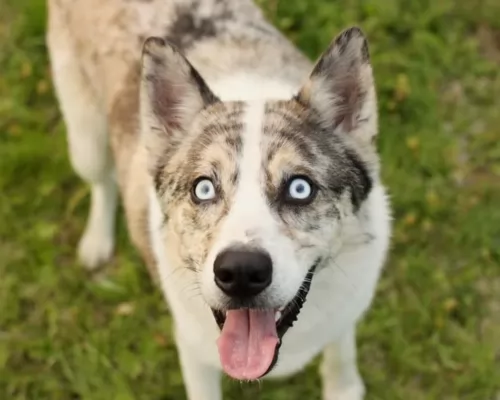 What a beautiful dog the Shepherd Husky is. He is a mix between the Husky and the German Shepherd. Other names for him include Gerberian Shepsky, German Husky and Siberian Shepherd.
What a beautiful dog the Shepherd Husky is. He is a mix between the Husky and the German Shepherd. Other names for him include Gerberian Shepsky, German Husky and Siberian Shepherd.
The German Shepherd originated in Germany and the Husky is from Siberia. We assume this mixed breed dog was bred in the USA. The true origin of the German Shepherd Husky dog is unclear but both the parent breeds have long histories.
The dog is recognized as a Hybrid by both the Dog Registry of America as well as the American canine hybrid Club.
The Yochon is a “designer dog” – a cross between the Yorkshire Terrier and the Bichon Frise. They are not a purebred and are not recognized by purebred dog clubs such as the American Kennel Club (AKC). They are small, playful, families dogs. Most of them bear the best characteristics of each of their founding breeds, but because they are crossbreeds and most will be multi-generational cross breeds, there are no two dogs alike.
Though not recognized by the traditional purebred clubs they are recognized by several hybrid canine clubs. The cross was developed in the United States.
Description
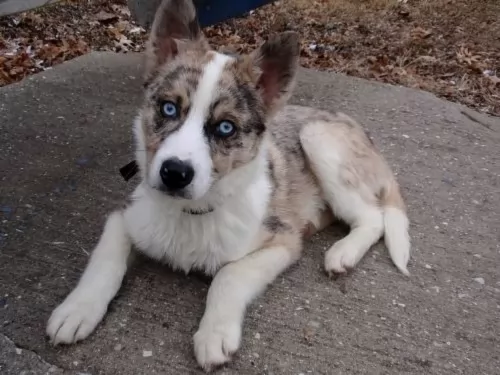 Solid and strong, the German Shepherd Husky mix is attractive. He is a fairly large dog standing at 51 to 64cm in height and weighing between 20 to 40kg.
Solid and strong, the German Shepherd Husky mix is attractive. He is a fairly large dog standing at 51 to 64cm in height and weighing between 20 to 40kg.
They’re powerful dogs these as they have a long history of being working dogs. The eyes of this beautiful dog can be brown, green or blue or a mix of these. The thick double coat protects them from the cold and in the warmer months, he sheds quite a bit.
The coat can be brown, black and tan or it can have creamy shades and be mixed with grey and white too.
Temperament:
The Shepherd Husky is a friendly, amicable dog who wants to please his owner. Training and socialization make him even more well adjusted. He is a dog that will get on well with children in the home as well as other dogs.
He is such an all rounder this dog – loyal, intelligent, social and loving - being great for accompanying you on walks and hikes but being willing to sit with you indoors too.
While he is adaptable and good natured and will happily live with his owner in the city or the countryside, he is better suited to life in the countryside. He also makes a great guard-dog.
Yochons go by many different names but in general they are toy dogs, weighing in at under 20 pounds, most weighing 6-12 pounds. They have black noses, long tails, and round eyes. Their muzzles are blunt and their skulls are also round.
They have fluffy, full coats that can range from tan, to brown to black. They can also be white or cream. Their ears can be either hanging or erect.
Characteristics
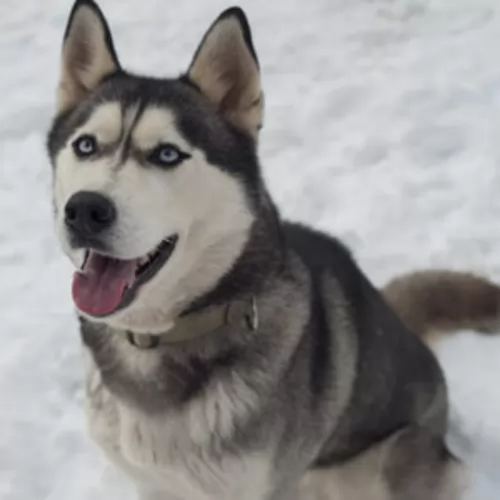 The German Shepherd Husky mix is such an ideal dog for single people, couples and families. This wolf-like breed is intelligent, loving,social and protective – the ideal family dog.
The German Shepherd Husky mix is such an ideal dog for single people, couples and families. This wolf-like breed is intelligent, loving,social and protective – the ideal family dog.
For those looking for an active dog that can be their jogging, walking and camping partner, this dog is for you. He loves to be busy, but he also loves being made a fuss of indoors too.
He has so many excellent qualities and is one dog breed that ticks all the right boxes for being such an all-round splendid pet and companion.
1 Children friendliness -yes very good but watch careful that children do not hurt them as they are so small and fragile.
2.Special talents – Loves families and playing
3.Adaptability – adapts well to apartments can play indoors
4.Learning ability – intelligent and independent
Health Problems
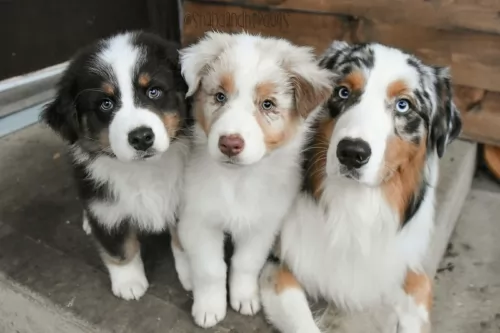 This is such a robust dog that you an scarcely think of him being sickly and yet there are some illnesses that are common to all dogs and which your German Shepherd Husky mix might get as well.
This is such a robust dog that you an scarcely think of him being sickly and yet there are some illnesses that are common to all dogs and which your German Shepherd Husky mix might get as well.
Hip dysplasia is common in German Shepherd dogs as well as arthritis and thyroid dysfunction. Bloat and cancer are other diseases to watch for.
Hip Dysplasia:
Canine hip dysplasia is a genetic disease characterised as a disease of the hip. The malformation can lead to arthritis and pain and ultimately lead to the loss of hip function, crippling your dog.
You will need to get your pet to the vet for treatment to make his life more comfortable.
Both founding breeds are vulnerable to a few medical conditions. These include:
• Legg-Calve-Perthes Disease – insufficient blood to hind legs, thigh bones causing lameness.
• Patellar Luxation – slipped kneecaps can also cause lameness.
• Dental Issues – keep teeth brushed and cleaned.
• Hypothyroidism – can be treated with medication.
• Reverse Sneezing
• Allergies
• Collapsed Trachea due to small size – be careful with them at all times.
Caring The Pet
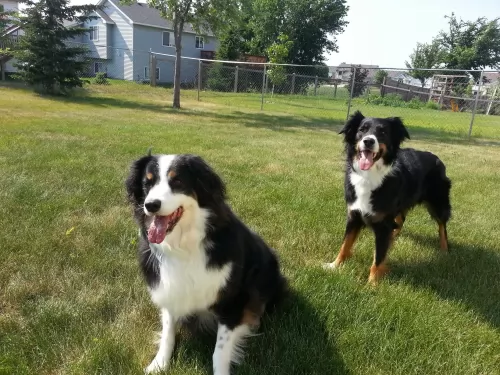 ◆Brush the coat of your Shepherd Husky twice a week to rid the coat of loose hairs. This dog’s hair sheds quite heavily as the weather warms and he may require brushing more often.
◆Brush the coat of your Shepherd Husky twice a week to rid the coat of loose hairs. This dog’s hair sheds quite heavily as the weather warms and he may require brushing more often.
◆When you brush him, check the ears and eyes for infection. The eyes must be bright and clear.
◆Feel for unusual lumps on your pet’s body.
◆Provide your beautiful pet with a comfortable dry place to sleep.
◆Never neglect his exercise needs.
◆Keep your pet’s vaccines up to date to eliminate killer canine diseases.
◆Have your pet spayed or neutered to avoid unwanted puppies.
◆Feed your Shepherd Husky the best food there is as he is an energetic, working breed. The commercially manufactured foods can be a good, convenient choice but you need to make sure it is one of the better brands.
Some of the cheaper brands are full of bad ingredients that can make a dog sick.Try and give him some home-made foods that are healthy and nutritious. This food can be added to his dry kibble twice a week.
Boiled chicken, brown rice or pasta and spinach, sweet potatoes and carrots are a tasty healthy choice for your pet. Try and include some raw meat into the diet as well.
Ensure there is always a bowl of fresh, cool water for him.
3.Feeding the puppy – do not overfeed. Use a high quality puppy toy breed kibble. Feed 3-4 X day.
2.Feeding the adult – do not overfeed. Use a high quality adult toy breed kibble. Feed at least twice a day.
3.Points for Good Health hearty/general good health and stamina
4. Games and Exercises does not need a lot of exercise . They enjoy obedience and agility trials.
Comparison with other breeds
- Yochon vs English Bulldog - Breed Comparison
- Yochon vs German Shepherd - Breed Comparison
- Yochon vs Golden Retriever - Breed Comparison
- Yochon vs Labrador Retriever - Breed Comparison
- Yochon vs West Highland White Terrier - Breed Comparison
- Yochon vs French Bulldog - Breed Comparison
- Yochon vs Beagle - Breed Comparison
- Yochon vs Yorkshire Terrier - Breed Comparison
- Yochon vs Poodle - Breed Comparison
- Yochon vs Rottweiler - Breed Comparison
- Yochon vs Boxer - Breed Comparison
- Yochon vs English Pointer - Breed Comparison
- Yochon vs Siberian Husky - Breed Comparison
- Yochon vs Doberman Pinscher - Breed Comparison
- Yochon vs American Bully - Breed Comparison
- Yochon vs Abruzzenhund - Breed Comparison
- Yochon vs Affenpinscher - Breed Comparison
- Yochon vs Afghan Hound - Breed Comparison
- Yochon vs Aidi - Breed Comparison
- Yochon vs Airedale Terrier - Breed Comparison
- Yochon vs Akbash Dog - Breed Comparison
- Yochon vs Akita - Breed Comparison
- Yochon vs Africanis - Breed Comparison
- Yochon vs Askal - Breed Comparison
- Yochon vs Atlas Terrier - Breed Comparison
- Shepherd Husky vs English Bulldog - Breed Comparison
- Shepherd Husky vs German Shepherd - Breed Comparison
- Shepherd Husky vs Golden Retriever - Breed Comparison
- Shepherd Husky vs Labrador Retriever - Breed Comparison
- Shepherd Husky vs West Highland White Terrier - Breed Comparison
- Shepherd Husky vs French Bulldog - Breed Comparison
- Shepherd Husky vs Beagle - Breed Comparison
- Shepherd Husky vs Yorkshire Terrier - Breed Comparison
- Shepherd Husky vs Poodle - Breed Comparison
- Shepherd Husky vs Rottweiler - Breed Comparison
- Shepherd Husky vs Boxer - Breed Comparison
- Shepherd Husky vs English Pointer - Breed Comparison
- Shepherd Husky vs Siberian Husky - Breed Comparison
- Shepherd Husky vs Doberman Pinscher - Breed Comparison
- Shepherd Husky vs American Bully - Breed Comparison
- Shepherd Husky vs Abruzzenhund - Breed Comparison
- Shepherd Husky vs Affenpinscher - Breed Comparison
- Shepherd Husky vs Afghan Hound - Breed Comparison
- Shepherd Husky vs Aidi - Breed Comparison
- Shepherd Husky vs Airedale Terrier - Breed Comparison
- Shepherd Husky vs Akbash Dog - Breed Comparison
- Shepherd Husky vs Akita - Breed Comparison
- Shepherd Husky vs Africanis - Breed Comparison
- Shepherd Husky vs Askal - Breed Comparison
- Shepherd Husky vs Atlas Terrier - Breed Comparison
 Petzlover
Petzlover Both Shepherd Husky and Yochon are originated from United States. Shepherd Husky may grow 36 cm / 15 inches higher than Yochon. Shepherd Husky may weigh 31 kg / 69 pounds more than Yochon. Both Shepherd Husky and Yochon has same life span. Both Shepherd Husky and Yochon has almost same litter size. Both Shepherd Husky and Yochon requires Moderate Maintenance.
Both Shepherd Husky and Yochon are originated from United States. Shepherd Husky may grow 36 cm / 15 inches higher than Yochon. Shepherd Husky may weigh 31 kg / 69 pounds more than Yochon. Both Shepherd Husky and Yochon has same life span. Both Shepherd Husky and Yochon has almost same litter size. Both Shepherd Husky and Yochon requires Moderate Maintenance.  What a beautiful dog the Shepherd Husky is. He is a mix between the Husky and the German Shepherd. Other names for him include Gerberian Shepsky, German Husky and Siberian Shepherd.
What a beautiful dog the Shepherd Husky is. He is a mix between the Husky and the German Shepherd. Other names for him include Gerberian Shepsky, German Husky and Siberian Shepherd. Solid and strong, the German Shepherd Husky mix is attractive. He is a fairly large dog standing at 51 to 64cm in height and weighing between 20 to 40kg.
Solid and strong, the German Shepherd Husky mix is attractive. He is a fairly large dog standing at 51 to 64cm in height and weighing between 20 to 40kg. The German Shepherd Husky mix is such an ideal dog for single people, couples and families. This wolf-like breed is intelligent, loving,social and protective – the ideal family dog.
The German Shepherd Husky mix is such an ideal dog for single people, couples and families. This wolf-like breed is intelligent, loving,social and protective – the ideal family dog. This is such a robust dog that you an scarcely think of him being sickly and yet there are some illnesses that are common to all dogs and which your German Shepherd Husky mix might get as well.
This is such a robust dog that you an scarcely think of him being sickly and yet there are some illnesses that are common to all dogs and which your German Shepherd Husky mix might get as well. ◆Brush the coat of your Shepherd Husky twice a week to rid the coat of loose hairs. This dog’s hair sheds quite heavily as the weather warms and he may require brushing more often.
◆Brush the coat of your Shepherd Husky twice a week to rid the coat of loose hairs. This dog’s hair sheds quite heavily as the weather warms and he may require brushing more often.